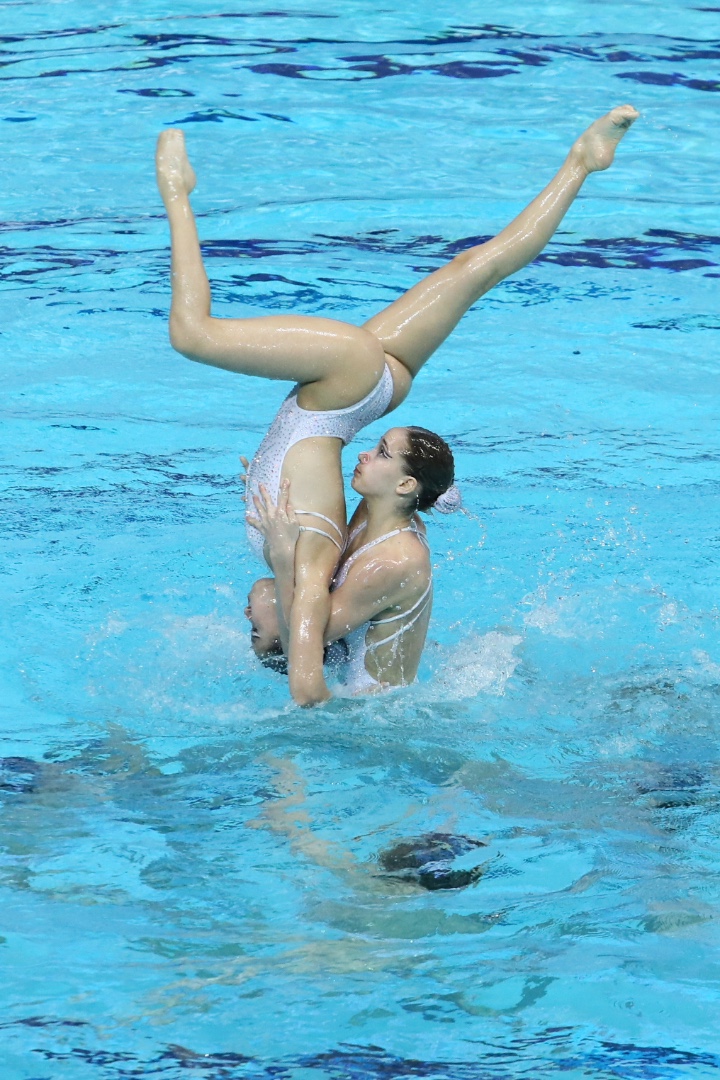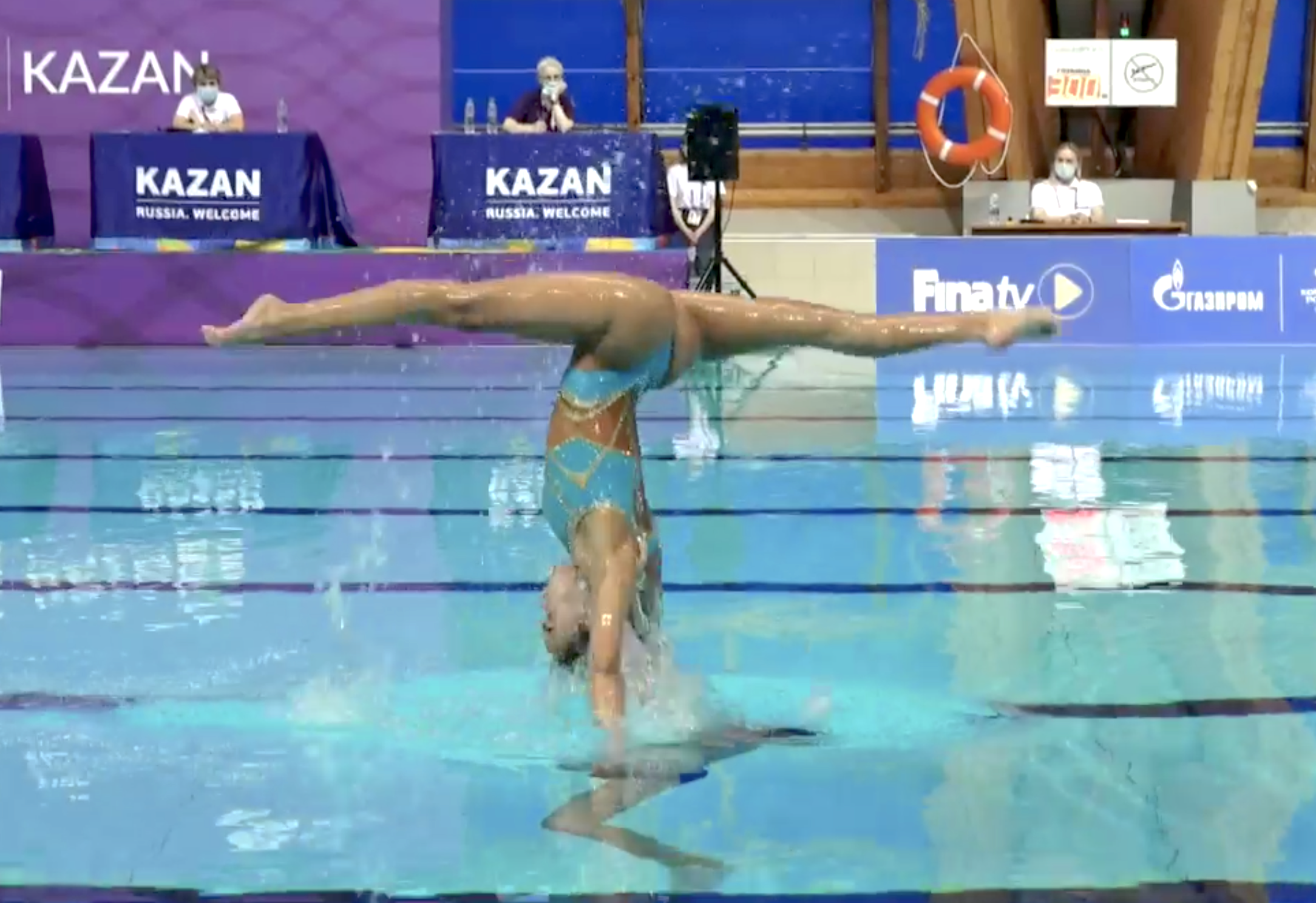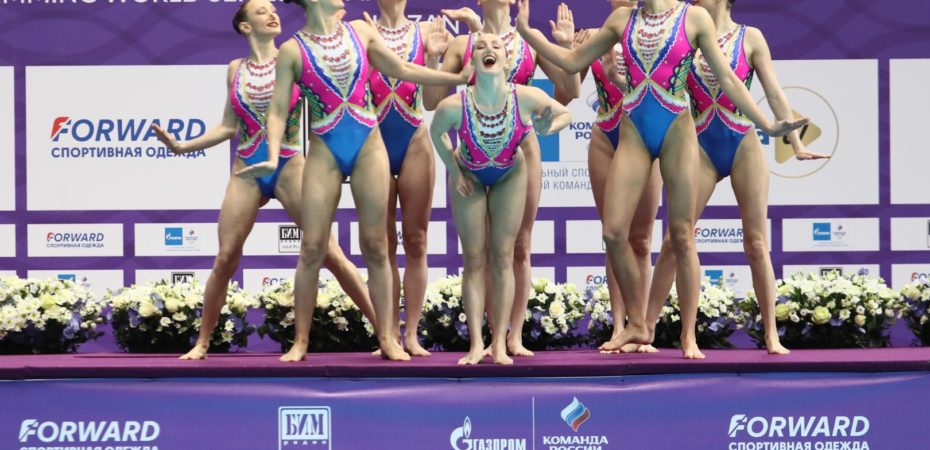In the second in-person FINA Artistic Swimming World Series of the season, the Russian athletes undoubtedly dominated the competition. At home and in front of a small crowd in the stands, they won nearly every event they were entered in.
The senior Olympic squad competed in the technical duet and team events. Svetlana Romashina and Svetlana Kolesnichenko unexpectedly unveiled a brand new choreography to the song “With Russia From Love” from the band Little Big.
The pair had originally created a special Tokyo-themed routine for the Olympics, which fans had seen already in competition in 2019. However with the postponement of the Games and the WADA ban on the Russian Federation, they decided to make some strategic, and patriotic, changes.
“During the lockdown, we decided to do something new, and we had enough time,” Romashina told R-Sport. “We chose to use a remix of Kalinka from the band Little Big, and decided that our Russian theme should be present. We hope it will sound very loudly at the Olympics.”
The technical team roster was absurdly stacked. The 2020 Russian Olympic team might very well be the strongest, ever. It features six massively experienced, returning Olympic champions in Vlada Chigireva, Svetlana Kolesnichenko, Aleksandra Patskevich, Svetlana Romashina, Alla Shishkina, and Maria Shurochkina. All have a grand total of 13 Olympic gold medals among themselves. Adding Marina Golyadkina and Polina Komar, this team also has 85 World titles. They comfortably won the event here ahead of Japan’s Olympic team with a 96.7548, keeping their Quadrille choreography from 2019.
This competition marked Patskevich‘s return after nearly four years. She had stepped away from the pool after the 2017 FINA World Championships to start her family. After the birth of her first child, she had announced her comeback to elite in the fall of 2019. Romashina and Kolesnichenko were also back in a team event for the first time since the 2016 Games.
Notably missing from the competition was Varvara Subbotina, 2019 World Champion with the team and alternate to the duet. Subbotina withdrew from the meet a few days earlier because of a ruptured eardrum. She hopes to recover quickly enough for the European Championships in three weeks.
The free events were left to the Russian junior squad. Elizaveta Minaeva and Violetta Evenko, the reigning junior national champions, won silver with a 92.6000, only 0.4000 points behind Japan’s Olympic duet. Minaeva has been in the 13-15 and junior duet over the last few years alongside Kseniia Ladnaia. She unfortunately retired last season, and was replaced by Evenko, a three-time 2019 Youth World Champion. The two swim to a Black Eyed Peas remix and other hip-hop beats.

In the free team, the juniors actually upset Japan’s Olympic squad for the gold by 0.3000 points. The athletes used the choreography from the club team of the Olympic Synchronized Swimming Centre of Anastasia Davydova, which won both junior and senior nationals in 2020 and 2021. The routine, following the theme of “The Path,” is both fast yet intricate, powerful yet weightless, and might very well be one of the hardest junior routines ever created.
Finally, 2019 Youth World Champion and reigning Russian champion Daria Kirsanova won both solo events. She swam to Lara Fabian’s “Je t’aime” in tech for a 87.6972, while her “Witch Hunter” free routine received a 90.7000. The 16-year-old, already dominant nationally for over a year, looked poised to also prevail in junior international meets this year. She is coached by her mother and two-time Olympic champion Maria Kiseleva.
Agnia Tulupova wasn’t far behind for her first time out on the big international stage as a soloist. Tulupova, also a junior, was the talk of the pool at last fall’s senior nationals, and certainly showed why here. The potential for greatness is obvious, and she could surprise many with a little more experience under her belt in the next seasons.
With this show of depth and talent, the Russians look again unbeatable in the upcoming junior European and World Championships. Follow this crop of juniors closely, as many are likely to move up the ranks in the upcoming years after an unavoidable retirement spree amongst the seniors.
Barely back from their season opener in Budapest, the Russian mixed duets also led the technical and free events. Aleksandr Maltsev and Maya Gurbanberdieva received a new career-best score of 92.5174 in tech with their new “Bring Me to Life” routine. In free, Maltsev and Olesya Platanova also saw a new record score of 94.1333 for their “Rite of Spring” choreography. Russia’s second senior mixed pair of Alina Mantulenko and Mikhail Vasilev also competed, but could not officially receive a medal due to the one-per-country rule despite receiving the second-best scores of the meet.
After almost two years without international competitions, Japan sent its full Olympic team to Kazan. The Japanese had already shown all of their routines at the 2020 Japanese Nationals last fall. They however looked much more refined and precise here, particularly in their two new choreographies in free duet (“Robots”) and technical team (“Karate”). In the former, Inui Yukiko and Yoshida Megumu won Japan’s only gold of the competition, and kept Russia’s junior duet at bay with a score of 93.000.
While superior in difficulty, the “Japanese Festival” free team could not overcome the Russian juniors in execution and artistic impression.
Kazakhstan also sent its senior team, along with two of its younger mixed duets, to this meet. The squad earned bronze in free team with its “Moana” routine for a score of 81.9000. The Kazakhs won gold in Highlight with a new, weeks-old choreography set to Mussorgsky’s “Night on Bald Mountain.”
As for mixed duets, Youth World Champions Eduard Kim and Zhaklin Yakimova competed for the first time since 2019. They only swam in the free event and presented their new routine set to Aladdin’s OST. Now swimming in the junior category, the two are much more grown and experienced in the water. Winning bronze here with a 81.4000, the two seem ready to continue making history for their country at the Junior World Championships this summer.

Viktor Druzin and Karolina Ivanova were the second mixed pair for Kazakhstan, both making their international debut here. Despite being only 14 for a few more months, they tackled the technical elements and earned the bronze medal with a score of 72.0722. Their free routine, using the soundtrack from the movie “The Mask,” received a 74.8000.
Spain‘s duet of Emma Garcia and Pau Ribes rounded out the mixed duet field. The two had already competed at the virtual World Series back in January. In Kazan, they earned two silvers with new career-best scores, a 85.0703 in tech for their “Witch Hunter” routine, and 87.1333 in free for their new Cats choreography.
Finally, this competition was also quite successful for Serbia and Bulgaria. The former went home with one silver medal in the free solo event and two bronze in the duet events. Moreover, Jelena Kontic and Nevena Dimitrijevic received career-best scores in tech (77.7153) and in free (78.9667), a particularly encouraging feat as they prepare for the Olympic Qualification Tournament. Lastly, Bulgaria won its first-ever medals in the World Circuit series with a silver in technical solo and a bronze in free solo.
A few more nations were represented in the club rankings, separated from the World Series ones. Viktoria Reichova from Slovakia and Olympian Alzbeta Dufkova from the Czech Republic performed in both solo events. Dufkova’s club teammate Adela Janska also competed in the free solo, while another Czech duet from the SK UP Olomouc club swam in these events.
Of note, judges were a bit sparse at this competition. The Execution panel featured only three judges for the free solo, free duet, free team, technical duet and highlight events. The remaining two scores were obtained by averaging these three scores. The other panels (Difficulty and Artistic Impression) featured four judges, just like in Budapest the week prior. In the Highlight event, there were also only three judges in Difficulty.
ARTICLE BY CHRISTINA MARMET
Cover photo courtesy of the Russian Federation
If you’ve enjoyed our coverage, please consider donating to Inside Synchro! Any amount helps us run the site and travel costs to cover meets during the season.

